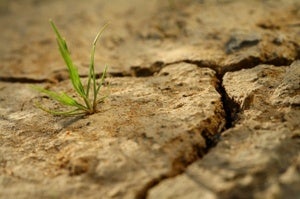November 1, 2011 — Critics who doubt dire predictions about global warming question how much difference, say, a 2-degree temperature increase could mean to the planet.
According to Aaron Bernstein, quite a bit.
Bernstein, a doctor at Children’s Hospital, instructor in pediatrics at Harvard Medical School, and Acting Associate Director of the medical school’s Center for Health and the Global Environment, was the first speaker in this year’s Environmental Health Colloquium Series, held on October 20, 2011 and sponsored by the Harvard School of Public Health’s Department of Environmental Health. An expert in how climate change and biodiversity loss can affect human health, Bernstein, MPH ’09, said that even a small global temperature increase could lead to troubling consequences, like rising sea levels, population displacement, disruption to the food supply, flooding, and an increase in infectious diseases.
While some don’t believe that greenhouse gases caused by humans are the main culprit behind global warming, Bernstein showed graphs indicating otherwise. The data, he explained, show pronounced increases in greenhouse gas levels in the United States during the Industrial Revolution of the late 1800s as well in the 1950s, when there was a postwar manufacturing boom.
Three consequences of climate change—rising sea levels, rising temperatures, and increased precipitation—stand to have the greatest impact on human health, Bernstein said. With rising sea levels, salt water can seep into into groundwater tables and taint the drinking water supply, and can also displace populations from low-lying areas. “And displaced populations have notoriously poor health statistics,” he said.
Heat waves—another consequence of global warming—can lead to thousands of heat-related deaths. Beyond that, there can be other troubling effects: decreases in crop yields, droughts, and dry conditions ripe for wildfires. Wildfires, in turn, lead to deforestation. Since trees absorb much of the excess carbon dioxide in the atmosphere, fewer trees mean higher levels of greenhouse gases in the atmosphere—thus perpetuating the cycle in which warmer temperatures wreak atmospheric havoc.
Global warming can also cause abnormally heavy rains. A warmer atmosphere holds more moisture than a cooler one, Bernstein explained, but when it reaches capacity, the rain can be overwhelming. As an example, he cited the unprecedented spring flooding in the Midwest, which prompted the Army Corps of Engineers to intentionally breach the Birds Point levee in southeastern Missouri. The move saved the town of Cairo, Illinois, but it swamped 130,000 acres of Missouri farmland and 100 homes.
“These are the kinds of choices that we’re going to be increasingly facing,” Bernstein said.
But he noted that the potentially devastating consequences of global warming can be avoided as long as governments and individuals take seriously the importance of reducing greenhouse gas levels. While the facts about global warming are depressing, “there are definitely solutions to some of these problems,” said Bernstein.
–Karen Feldscher
photo: iStockphoto.com
